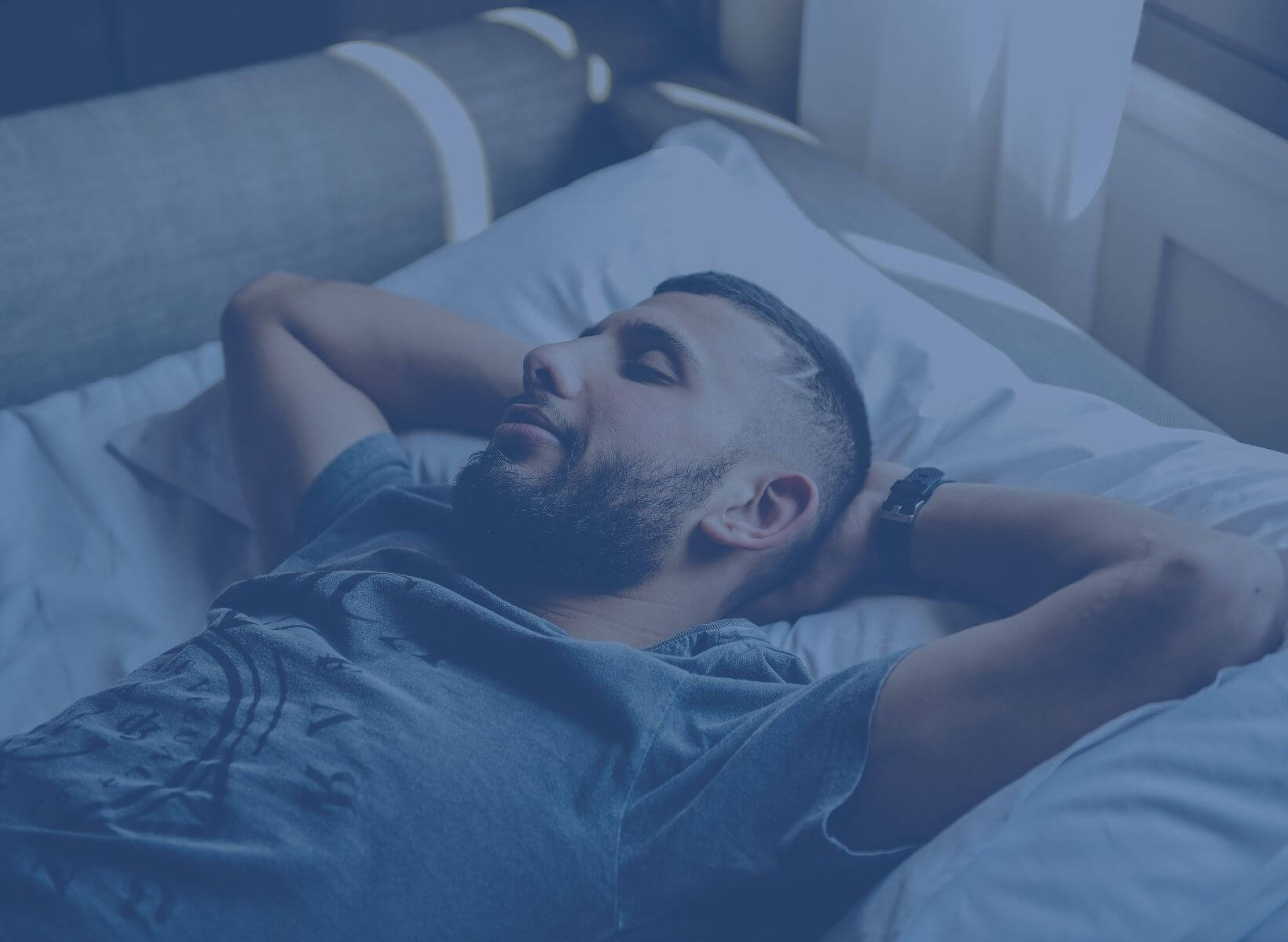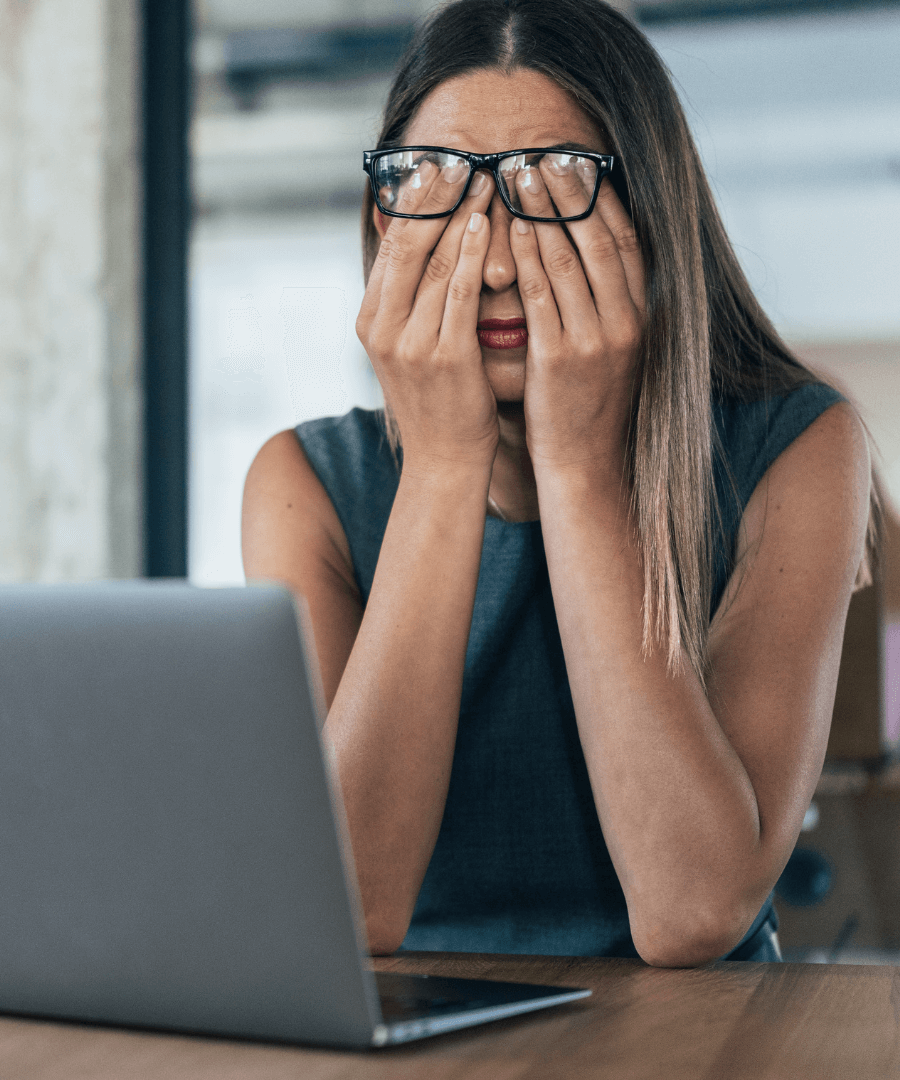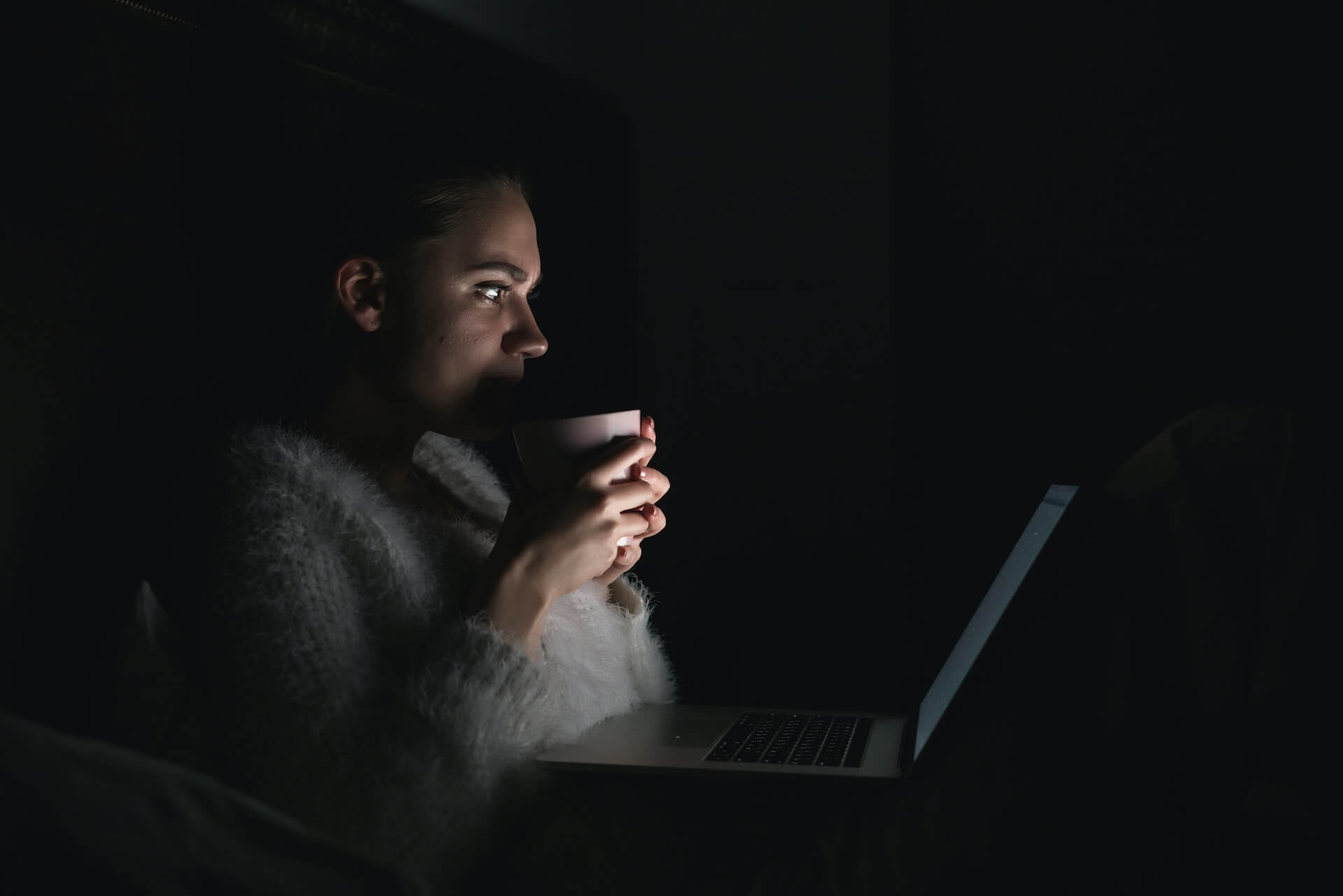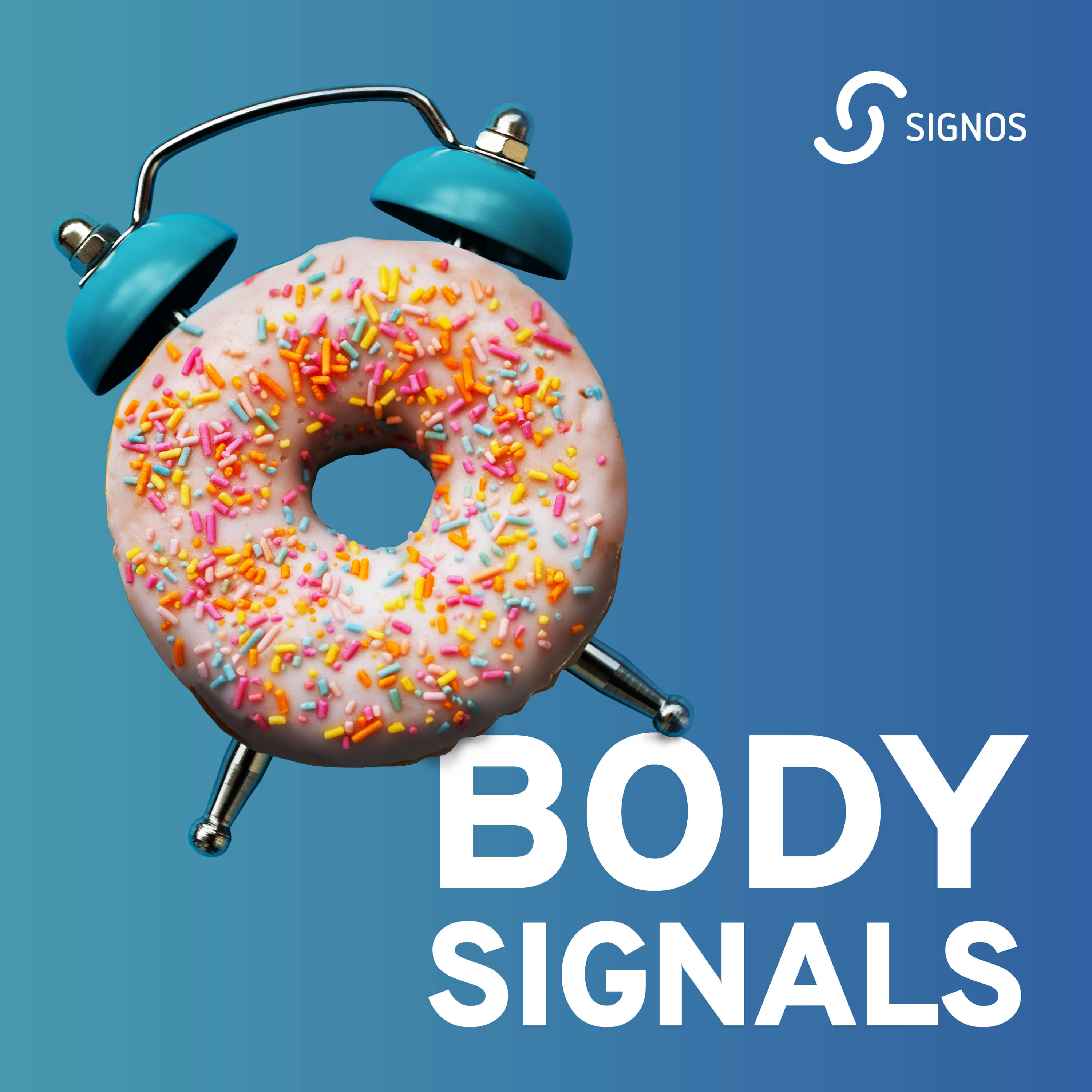If you wake up most mornings feeling drained, wondering how you’ll ever get through the day, you may be neglecting a crucial aspect of your health: sleep.
Most Americans Do Not Get Enough Sleep
Lack of sleep is an underrecognized public health crisis. For optimal well-being, adults between the ages of 18 and 60 need between seven and nine hours of sleep in a 24-hour interval. But according to a survey by the Centers for Disease Control and Prevention, <sup>1</sup>(CDC) of nearly half a million respondents, more than one in three Americans do not get adequate sleep.
Sleep deprivation is a killer
That’s a terrifying statistic in view of this bone-chilling fact: Sleep deprivation is a killer. More than two dozen studies published in peer-reviewed journals have linked inadequate sleep to higher mortality<sup>2</sup> from multiple causes.
Chronic conditions aggravated by sleep deprivation
Sleep deprivation can aggravate many chronic conditions, including, metabolic syndrome<sup>3</sup>, diabetes, and heart disease<sup>4</sup> . It can derail weight-loss efforts and has a negative effect on aspects of daily function, such as mood, memory, and cognition. And lack of sleep can render you more vulnerable to infection through its effects on inflammation and hampering your immune system<sup>5</sup>.
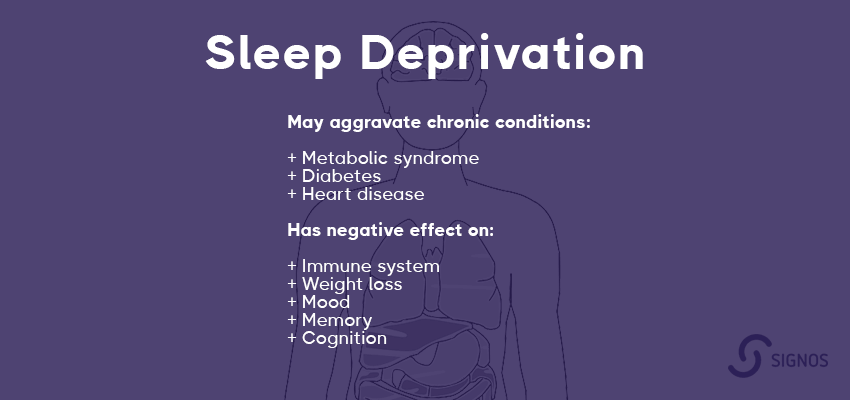
Isn’t Feeling Tired All the Time Just Part of Life?
In our hectic 24/7 industrialized world, sleep is sometimes seen as an unproductive waste of time. Imagine how much more I could accomplish if I didn’t have to sleep, some say. The truth is, it is the lack of sleep that ravages productivity.
Sleep deprivation is linked to mistakes
Economists estimate that financial losses due to sleep deprivation total a staggering $411 billion <sup>6</sup> each year in the United States alone. Employee absenteeism due to illness, reduced work efficiency, difficulty with learning new skills, on-the-job mistakes, and accidents are all consequences of inadequate sleep.
Notorious incidents where lack of sleep played a role include the Exxon Valdez oil spill, the space shuttle Challenger explosion, and the nuclear disasters of Chernobyl and Three Mile Island. Closer to home, sleep deprivation has been implicated as a factor in one out of five serious car crashes<sup>7</sup>.
Why You Might Be Tired But Not Sleepy
Physical fatigue vs sleepiness
There is a difference between physical fatigue and readiness to fall asleep. You may have experienced the feeling of your body being exhausted while your mind is racing. You lay in bed awake replaying events from the past in your head or planning for a busy day to come.
Insomnia triggers
The persistent inability to fall asleep or remain asleep is called insomnia. It may be triggered by travel, stress, illness, and emotional conditions such as anxiety. Poor sleep habits carried long-term can also lead to a pattern of delayed and interrupted sleep. And we’ve already seen the serious health consequences of poor sleep. If you aren’t getting the quantity and quality of sleep your body deserves, do something about it today.
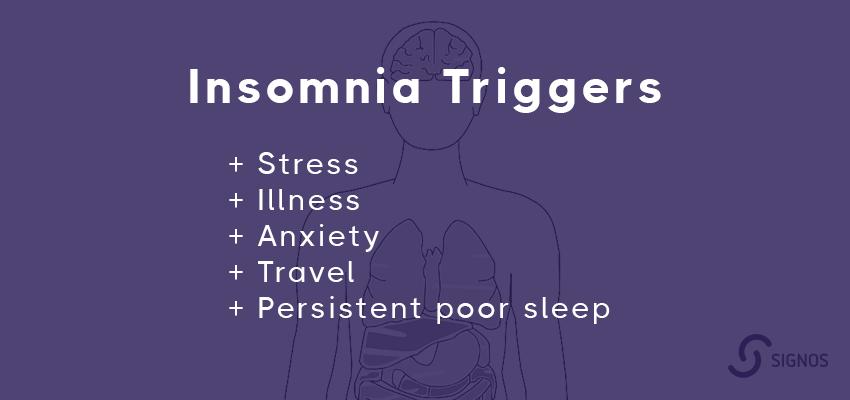
11 Tips to Improve Sleep Quality
1. Design your bedroom for optimal sleep
For optimal sleep, bedrooms should be uncluttered, dark, quiet, and cool. This can be easier said than done, particularly in a bustling urban setting. Consider using dark drapes to keep out stray light. Silicone earplugs and aesthetically pleasing sound foam panels can help reduce unwanted noise. White noise or natural sound (such as rain or waves) machines can further help mask street noise. Many adults report sleeping better in cool bedrooms, with a temperature around 65 degrees Fahrenheit, but this can be a matter of personal preference.
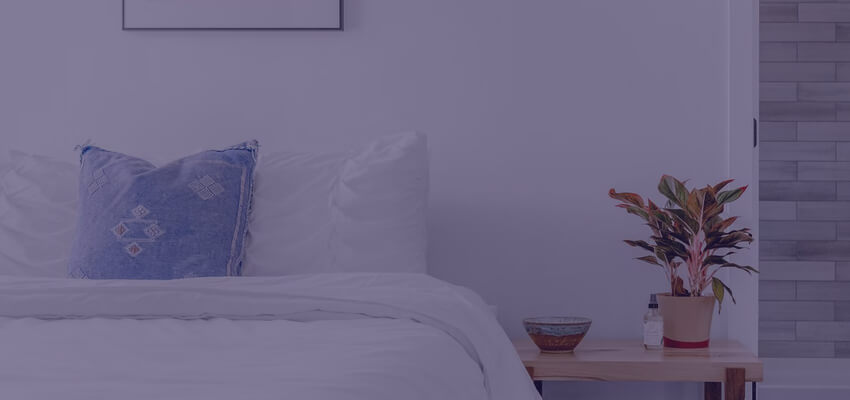
2. Use your bedroom as a haven to sleep
For some of us, our bedrooms double as our offices, study rooms, entertainment rooms, even our YouTube channel studios. If possible, limit activities in your bedroom. Your brain needs to know that when your body is in the bedroom, it’s there to rest. Move that flat-screen TV to the living room. Check your emails at the dining room table before going to bed (just wear blue light blockers).
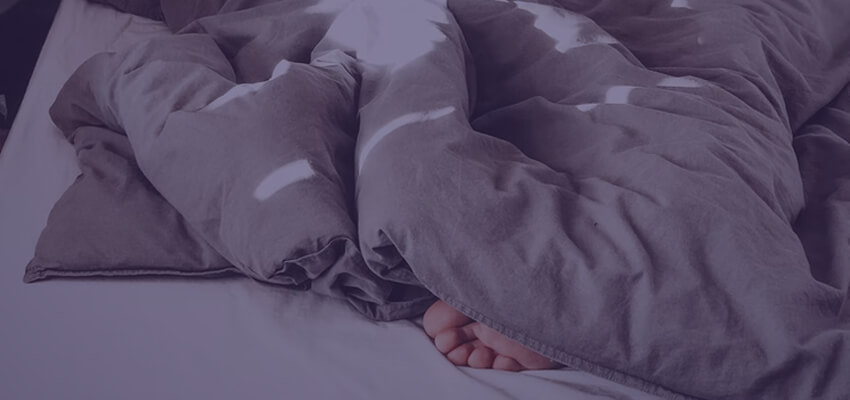
3. Limit in-bed activities
Sleep experts like to say there are only two activities that should take place in bed. One of them is sleep.
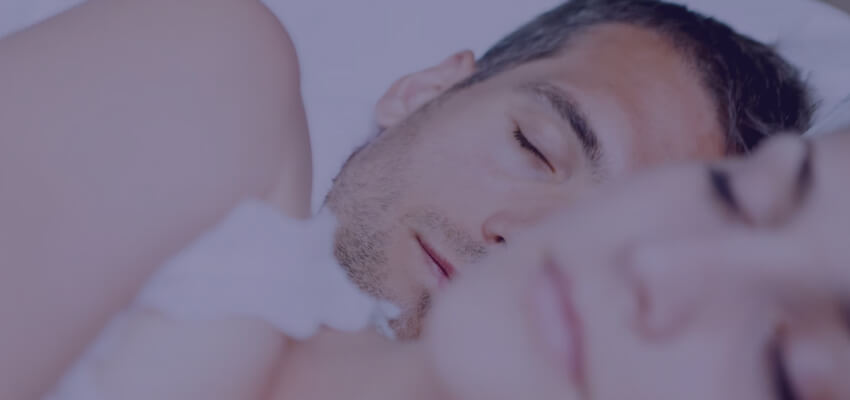
4. Check the status of your bed
Your mattress, choice of pillow, and the feel of your sheets can all affect your sleep quality. Mattress firmness and pillow thickness are certainly matters of personal preference. As far as bedding goes, clean, unruffled sheets can provide extra comfort without additional expense.
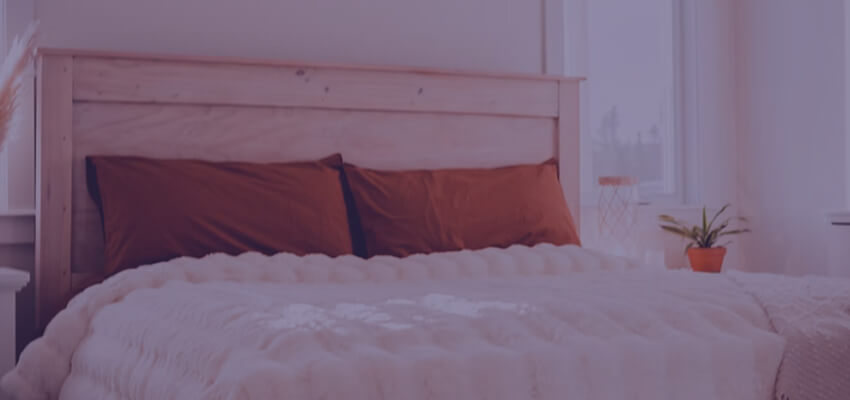
{{mid-cta}}
5. Watch what you eat and drink
Limit your daily intake of caffeine. Avoid it altogether in the afternoon and evening.
Energy drinks<sup>8</sup> come in different sizes and may contain a variety of ingredients. They are almost always spiked with large amounts of caffeine and added sugar. Some users report a temporary rush that feels like a boost of energy. Unfortunately, the habitual use of these products can lead to a vicious cycle<sup>9</sup> of disordered sleep and fatigue. Caffeine is known to worsen sleep, so more caffeine is needed to counteract the resulting fatigue the next day.
This leads to what is known as the caffeine sandwich—consecutive days of high caffeine intake, separated by a period of caffeine withdrawal known as sleep.
<p class="pro-tip">For a midday energy boost, rather than reaching for that energy drink, try some stretching exercises coupled with deep cleansing breaths, or take a walk in the fresh air and sunlight.</p>

A few drinks at the end of a hard day in the comfort of one’s home might seem like a harmless way to fall asleep faster. In some people, alcohol may shorten the time it takes to fall asleep (what doctors refer to as sleep latency). In others, it can cause insomnia. In either case, alcohol intake near bedtime wreaks havoc on your sleep<sup>10</sup>.
What alcohol does to your sleep:
- Disrupts the circadian cycle
- Worsens snoring and sleep apnea
- Shortens overall sleep duration
- Interferes with normal brain-wave activity during sleep.
Limit your alcohol consumption to moderate levels to accompany meals (one glass of wine for women, two for men). Try to avoid drinking in the hour or two leading up to bedtime.
<p class="pro-tip"><strong>Related reading:</strong> Alcohol and your blood sugar </p>
Eat a balanced diet rich in fruits and vegetables. Foods that elevate the glycemic index<sup>11</sup> (such as simple sugars, white pasta, and white bread) have been shown to increase the odds of insomnia in some individuals. And whenever possible, avoid heavy meals late in the day.
<p class="pro-tip"><strong>Related reading:</strong> Macronutrients and a balanced diet</p>
6. Take a warm bath
A warm bath<sup>12</sup> (or shower) can help you fall asleep faster and improve the quality of your sleep. So can warm feet. A team of Swiss scientists from the University of Basel reported that dilation of blood vessels in the hands and feet<sup>13</sup> was a strong predictor of rapid sleep onset.

7. Avoid A.L.A.N. – Artificial Light At Night
Our eyeballs are continually bombarded with artificial light sources such as televisions, computer screens, and smartphones. These sources of light pollution can alter the levels of a natural hormone called melatonin<sup>14</sup> which is deeply involved in regulating our circadian cycle. Melatonin secretion from the pineal gland helps establish a normal sleep-wake cycle. So, avoid light at night (or wear glasses that help block blue light), but do try to get natural sunlight exposure during the day.

8. Get regular exercise
Moderate physical activity carries innumerable beneficial health effects. As it relates to sleep, this is a two-way street<sup>15</sup>. Exercise improves sleep, and better sleep leads to less fatigue and a higher likelihood you’ll engage in physical activity. Work on both at the same time to really boost your well-being.

9. Try a relaxation technique
Many people use yoga, meditation, and other techniques as a daily relaxation practice. A review of over 3,000 patient records by scientists at the National Institutes of Health determined there is moderate-strength evidence to conclude that mindfulness meditation<sup>16</sup> techniques significantly improve sleep quality.
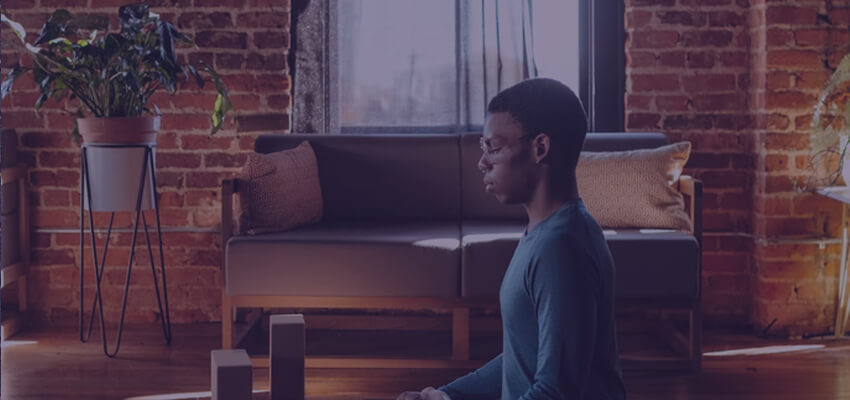
10. Put your nose to work
Speaking of relaxation, consider the use of soothing scents. One smell that has been shown to be calming is lavender,<sup>17</sup> a plant that produces a calming effect by its direct chemical action on the nervous system.

11. Don’t smoke
A large Canadian study measured urinary cotinine (a chemical marker of tobacco smoke exposure) in over 10,000 study participants. Subjects with higher cotinine<sup>18</sup> levels in their urine took longer to fall asleep, had more trouble staying asleep, and reported a lower level of sleep satisfaction.
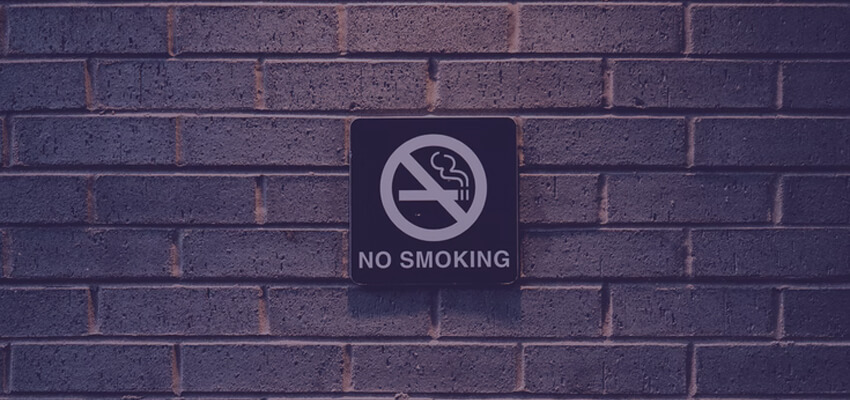
Sleep Quality Improvement Plan
What to do for better sleep
- Create a pro-sleep environment: white noise, dark, cool, and comfortable bedding
- Take a warm bath, meditate, and/or use soothing scents before bed
- Get regular exercise and create a relaxation routine
- Eat plenty of fruits and vegetables
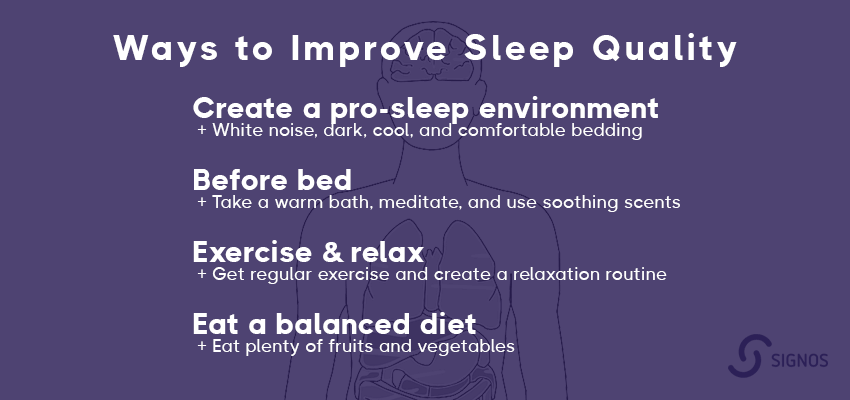
What to limit or avoid for better sleep
- Avoid clutter, artificial light, and non-sleep activities in your bedroom
- Avoid alcoholic drinks and other stimulants—especially before bed
- Avoid smoking and energy drinks. Limit caffeine and alcohol.
- Avoid heavy meals late in the day
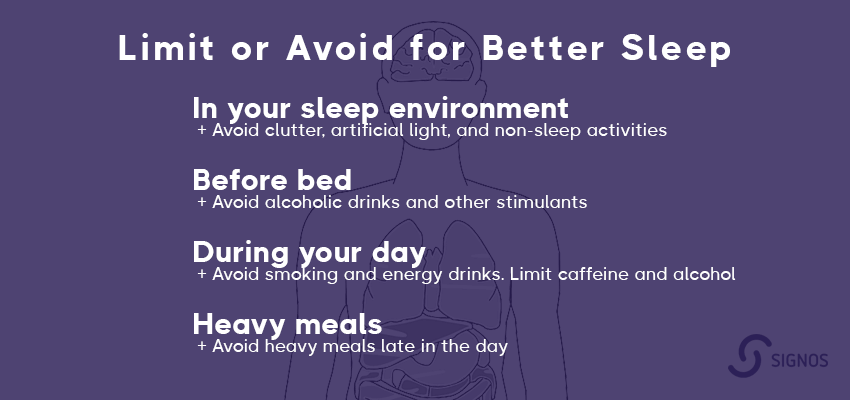
Don’t Hesitate to Seek Professional Help
Most people wouldn’t hesitate to see their doctor for a respiratory infection, bothersome back pain, to get a refill on their blood pressure prescription, or for a simple checkup. But for some reason, many of us don’t think we should bother our doctor with the issue of poor sleep. Some may be embarrassed to broach the subject. Others consider sleep a topic out of a doctor’s purview.
That attitude must change. Poor sleep can be attributed to treatable medical conditions such as depression and anxiety, and may be a mark of obstructive sleep apnea.
Obstructive sleep apnea
If you experience persistent daytime sleepiness, such as the tendency to fall asleep when riding in a car, reading a book, or watching TV, you may very well have undiagnosed obstructive sleep apnea. If that is the case, you should seek medical help immediately.
Imagine if, throughout the night, someone smothered you with a pillow until you roused yourself just enough to start breathing again. And then they did it again and again. Over and over, night after night. That, in essence, is obstructive sleep apnea, a condition of frequent microarousals from sleep due to breathing problems. Though loud snoring is a hallmark of the syndrome, in some individuals, this symptom is not prominent. So, lack of snoring does not preclude this condition.
Obstructive sleep apnea is linked to high blood pressure, strokes, heart disease, headaches, and declines in mental function. It can even precipitate sudden death<sup>19</sup>. The good news is that obstructive sleep apnea is easily diagnosed with a painless test (a sleep study) and highly effective treatments are available.
Sleep and the Tapestry of Good Health
The study of sleep reveals a recurring theme in wellness. Good health is a tapestry woven from a small number of threads: nutrition, exercise, sleep, and avoidance of harmful substances. One fiber intertwines with all the others and vice versa. If one thread snaps, the fabric unravels. Everything is connected.
With this in mind, we should work on improving habits in multiple spheres rather than focusing on an isolated target.
Tonight, try working on sleep.
- Item 1
- Item 2
- item 3
Topics discussed in this article:
References
1. https://www.cdc.gov/mmwr/volumes/65/wr/mm6506a1.htm
2. https://onlinelibrary.wiley.com/doi/10.1111/j.1365-2869.2008.00732.x
3. https://pubmed.ncbi.nlm.nih.gov/34023116/
4. https://pubmed.ncbi.nlm.nih.gov/28477772/
5. https://www.ncbi.nlm.nih.gov/pmc/articles/PMC5143488/
6. https://www.ncbi.nlm.nih.gov/pmc/articles/PMC5627640/
7. https://www.ncbi.nlm.nih.gov/pmc/articles/PMC6801009/
8. . https://www.ncbi.nlm.nih.gov/books/NBK19958/
8. https://www.ncbi.nlm.nih.gov/pmc/articles/PMC5627640/
9. https://www.cdc.gov/healthyschools/nutrition/energy.htm
10. https://www.ncbi.nlm.nih.gov/pmc/articles/PMC6292246/
11. https://www.ncbi.nlm.nih.gov/pmc/articles/PMC6997082/
12. https://www.sciencedirect.com/science/article/abs/pii/S1087079218301552
13. https://www.nature.com/articles/43366
14. https://www.ncbi.nlm.nih.gov/pmc/articles/PMC4334454/
15. https://www.ncbi.nlm.nih.gov/pmc/articles/PMC4341978/
16. https://www.ncbi.nlm.nih.gov/pmc/articles/PMC6557693/
17. https://www.ncbi.nlm.nih.gov/pmc/articles/PMC3612440/




